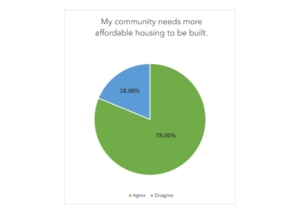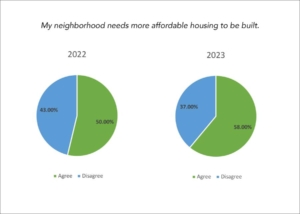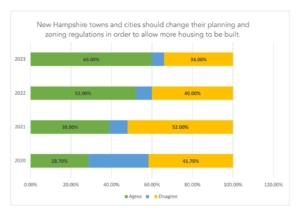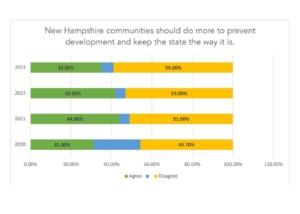Support for new housing surges as local boards keep saying no
Large majorities of Granite Staters support changing local land use regulations to allow the construction of more housing, the latest annual affordable housing survey from the Center for Ethics in Society at St. Anselm College reveals.
Support for more housing options has surged in the last year as home prices and rents have hit new records in New Hampshire. But despite huge and unprecedented levels of support for relaxing local regulations, news stories show that local boards continue to block new housing proposals when small groups of local residents turn out to oppose them.
In our hyper-partisan era, it’s unusual to get anywhere near 80% public support on an issue. Yet in New Hampshire, 78% of registered voters now agree that “my community needs more affordable housing to be built.” Only 18% disagreed. That 60-point gap was a 40-point gap last year.

Opposition to housing construction often comes from older voters who don’t want to see their communities change—and who already have homes. Younger people who face the prospects of huge rents and few available starter homes tend to take a more permissive view of new housing construction. The effect of high rents and home prices on younger voters was shown in the results of this new poll. In the survey, “not a single voter under 35 disagreed with the ‘more affordable housing in my community’ position,” according to the Center for Ethics in Society.
Voters have grown more receptive even to the idea that affordable housing should be built in their own neighborhood. The survey found that 58% of voters agreed that “My neighborhood needs more affordable housing to be built.” Support grew threefold in one year, from +7 in 2022 to +21 in 2023.

Significantly, voters have come to link the state’s severe housing shortage to local planning and zoning regulations. The survey found that 60% of voters agreed that “New Hampshire towns and cities should change their planning and zoning regulations in order to allow more housing to be built.” That 26-point gap was just a 12-point gap last year.

When the Josiah Bartlett Center asked voters in our 2021 poll whether they “support relaxing some local regulations to make it easier to build homes for people who need them,” 45% said yes and 34% said no. The growth over just two years in support for relaxing local land use regulations is remarkable.
Highly restrictive local land use regulations became pervasive throughout New Hampshire because they once had broad support. The damage they’ve done to the state’s housing market has become so obvious that support for anti-housing positions is collapsing.
The Center for Ethics in Society asked voters if “New Hampshire should do more to prevent housing development and keep the state the way it is.” Only 45% of New Hampshire voters disagreed with that statement in the 2020 survey. (Support was at 31%, with the rest undecided.) In this year’s survey, 59% of voters disagreed, representing a 14-point swing since 2020.

At the Josiah Bartlett Center, we’ve warned for years that if local governments continue to choke the housing supply by maintaining overly restrictive land use regulations, support for blanket state laws to override those regulations will grow. Sure enough, that is happening.
In 2021, 37% of voters supported and 38% opposed “a bill to allow property owners to build duplexes, triplexes, and fourplexes on any property served by municipal water and sewer, and where the zoning allows residential development.” Opposition to such a law has fallen nine points to 27%, and support has risen to 43%.
In the Legislature, opposition to such legislation is driven by a perception that voters back home disapprove. But that disapproval is eroding. If local governments don’t swiftly change course and begin allowing more housing, legislators will be pushed by voters to offer a state solution.
Manchester has made strong gains, approving approximately 2,000 new units’ worth of new construction in recent years, according to city officials. But projects still run into road blocks there, and in many other municipalities local boards routinely thwart new construction as a matter of course.
A few recent examples:
- Portsmouth’s Zoning Board of Adjustment voted against a plan to convert an abandoned animal hospital into 16 housing units.
- Swanzey’s Zoning Board of Adjustment voted against a proposal for an 18-unit residential development.
- Seabrook’s Zoning Board voted against a 332-unit luxury apartment development at the former greyhound track.
- Brady-Sullivan continues a two-year fight to convert old office building to apartments.
A sentiment often heard at local planning and zoning board meetings is that multi-family housing belongs in cities like Manchester, not in smaller communities. But most voters disagree with that, and the disagreement is growing stronger.
This year’s survey found that 64% of voters disagreed with the statement, “Our suburbs and rural towns should have mostly just single-family homes. Apartments, duplexes, and townhouses should be built only in cities.” That’s up from 61% two years ago.
After years of surging housing costs—and a concerted effort by reformers (including the Josiah Bartlett Center) to highlight the role local regulations play in driving those costs higher—overwhelming majorities of Granite Staters now support relaxing local land use regulations.
It’s now up to voters and boards to take up this cause at the local level. If they don’t, it’s only a matter of time before legislators pass state laws to free developers and property owners from the local regulations that prevent the market from supplying people with the homes they want and need.



